Gordon Bell on Creating Arcade Paradise's "Empathy"
Developing a game almost as mysterious as Polybius
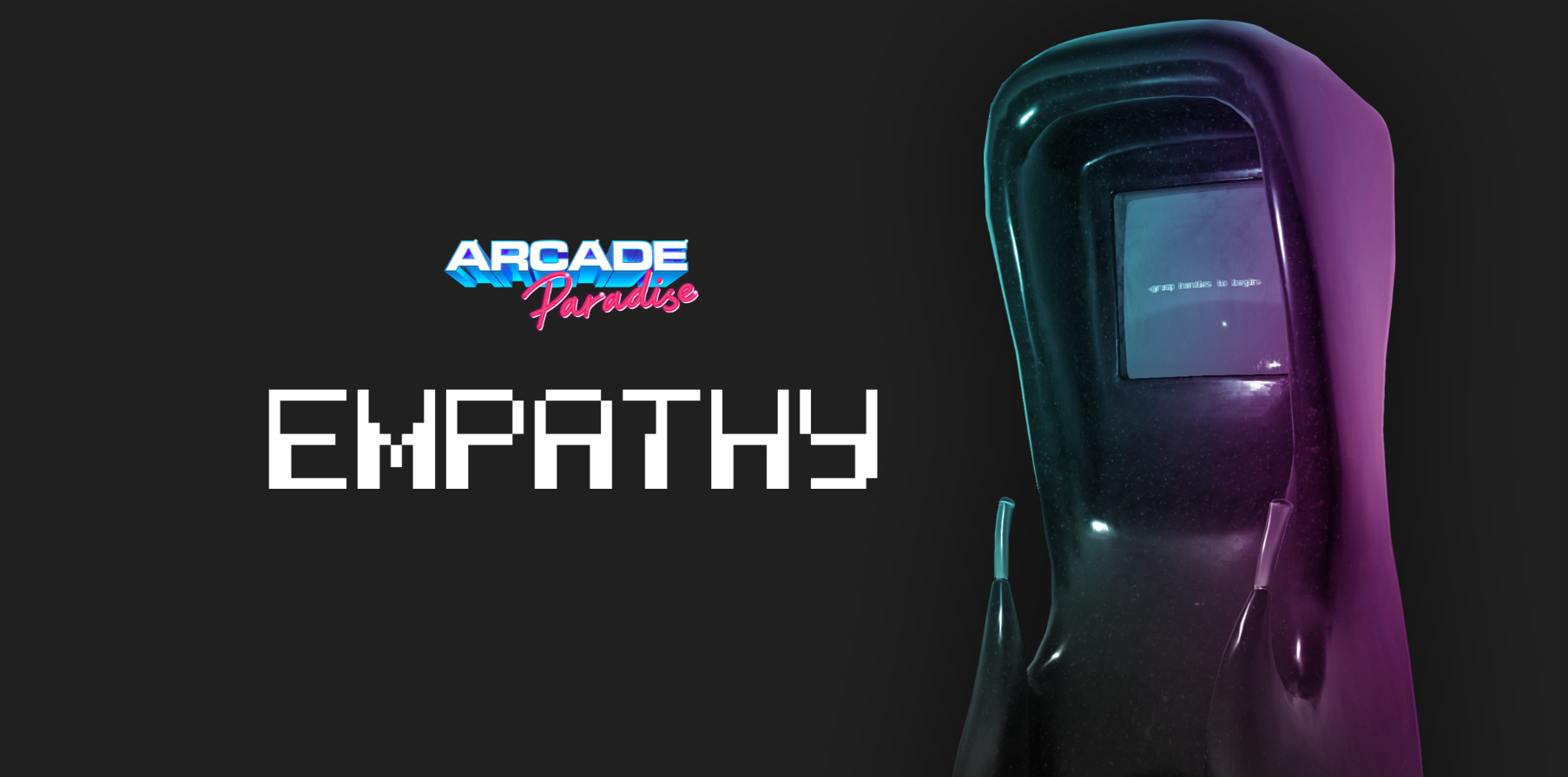
Arcade gaming has always struggled with an existential crisis, and the last few years have perhaps been the most challenging and threatening, as even the once unshakeable arcade havens of Akihabara have faced closures and auctions. There's always a chance to rebuild, and in 2022 Arcade Paradise captured the heart and spirit of gaming's first real culture.
Once you go past the early laundry management and start to procure some machines, you suddenly create a virtual space which very much feels like the real thing. In it are arcade games loosely or directly inspired by hits from yesteryear. They all feel familiar yet novel in their own right, but there is one mysterious cabinet which eerily stands out from the rest.
Urban myths may have been a bigger deal during the infancy of the internet, but gaming has seen a fair share of its own. None quite as mystifying and borderline convincing as Polybius. This was a machine which has enough evidence to suggest it once existed (maybe) and by now you know the drill: play the game and you lose your mind...or soul, or maybe both.
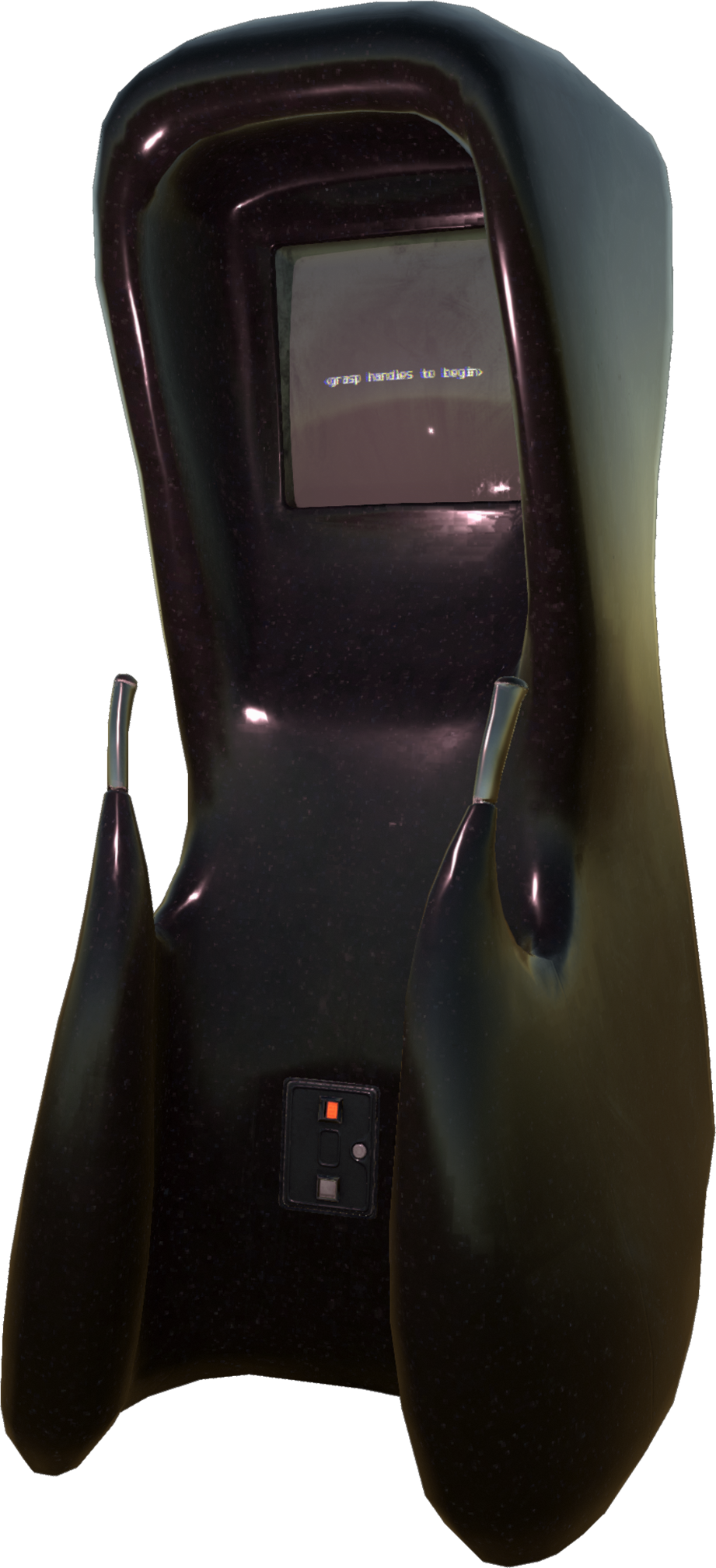
The carefully curated line up of machines in Arcade Paradise covers nearly all gameplay styles and genres, everything from a Pac-Man clone to a Missile Command lookalike, to an homage to Dance Dance Revolution. But then there is a mysterious black arcade cabinet in the corner, almost too spooky to approach, and it goes by a rather avant-garde name of Empathy.
Every cabinet featured in Arcade Paradise was uniquely designed by different creators. The selection offered here isn't the output of just one individual or just one team, but instead multiple creators contributed games, all which really could be sold on their own. Instead, each of these unique creations come together to bring life and context into the vibrant setting of Arcade Paradise. Where most games featured readily show their DNA roots, Empathy has a far more enigmatic origin.
Empathy comes from Gordon Bell, the current CTO of Nosebleed Interactive, who has been in the industry for over 25 years. The mysterious arcade cabinet which ended up in the first Arcade Paradise DLC went through quite a journey of its own before it could exist in its current state.
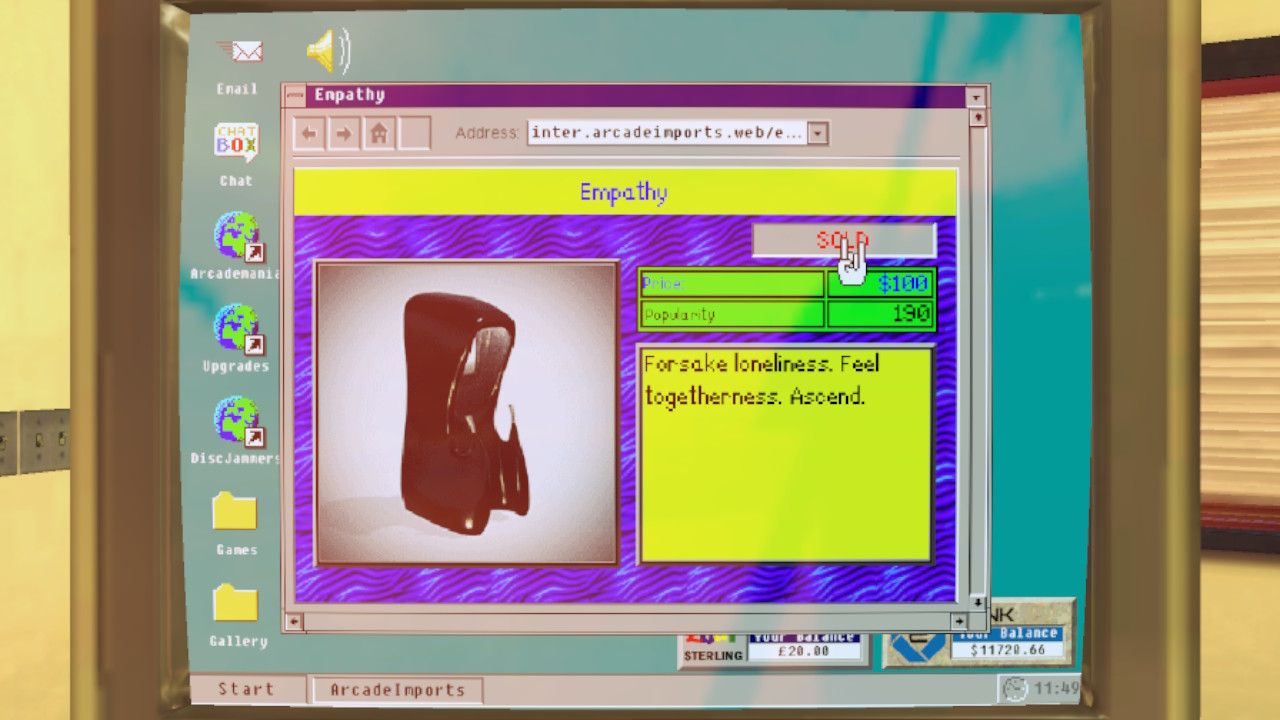
Gordon Bell talked us through how Empathy came to be. It all started with a film called Blade Runner. You might have heard of it; it features Harrison Ford in a non-Star Wars and non-Indiana Jones role, and was a film so far ahead of its time that it tanked in the box office when it first released, but only achieved more success over time. It deeply influenced Hideo Kojima and the themes explored in games like Snatcher and Metal Gear Solid, and it had a huge impact on Gordon's formative years too.
"Back in the mid-90s in the UK, when we were teenagers, a friend (Neil, who now works as a non-games software developer) and I became obsessed with the film Blade Runner after my dad made us watch it on VHS. As part of our obsession, and with nothing else better to do with our time, we did things like record the audio of the movie to an audio cassette and then attempt to transcribe it all into a text document. What can I say, we had pretty sheltered lives! We were nerdy kids and had dabbled in writing wee bits of pieces of software in the past, but with Blade Runner as the focus we decided to write a few different programs for PC and offer them as shareware."
Gordon Bell
A process that played a crucial role in the eventual creation of Empathy was shareware. Long before sharing files was as simple as dragging and dropping, there was an entire subculture during the '90s, particularly in PC gaming, which was less about sharing files and more about sharing created content. It was a subculture encouraged by id Software which subsequently enabled the creation of the fan-mod subculture for games like Doom and others. Gordon fondly remembers this era.
"It [shareware] was basically a way that anyone would distribute software they'd written. You'd send it off to a shareware company, and they'd add it to their catalogue. The public could then browse the catalogue and pay for the shareware company to send them a disc with their chosen items on it. The person that wrote the shareware didn't get any money directly, but you could include an advert on the disc and try to get people to pay you directly (or sell extra content directly, like a precursor to DLC).
So, we decided to create some shareware for Blade Runner and send it off. We typed up a list of 'interesting' facts, downloaded a couple of pictures from a BBS and included those, and wrote a couple of small programs: one to display a random quote from the film whenever you ran it, and another which was a simple quiz. We also decided to write a simple game.
Here's the listing from the shareware catalogue (which I was able to find and download a few months ago!)"
Gordon Bell

Blade Runner may have planted the initial inspiration for Empathy, but the game's most direct influence actually came from a cult classic sci-fi novel; the very same book which Blade Runner happened to be based on.
"Blade Runner is based on the novel "Do Androids Dream of Electric Sheep" by Philip K. Dick. The novel and the film have a lot of similarities, but the book also goes in some pretty crazy directions and is well worth a read.
In the novel they describe something called an 'Empathy Box'. Which is like an early video game. In the game you ascend a hill whilst unseen attackers throw rocks at you. As you play the game you feel a connection with everyone else playing at the same time, and hopefully empathize with them."
Gordon Bell

The "Empathy Box" featured in the novel would form the very blueprint for Gordon's own Empathy. Gordon highlights a few quotes from the novel which shaped the design of his game, both the gameplay as well as the visualization of the arcade cabinet:
- "Time to grasp the handles, he said to himself, and crossed the living room to the black Empathy Box."
- "He grasped the twin handles. The visual image congealed; he saw at once a famous landscape, the old, brown, barren ascent, with tufts of dried-out bonelike weeds poking slantedly into a dim and sunless sky. One single figure, more or less human in form, toiled its way up the hillside: an elderly man wearing a dull, featureless robe, covering as meager as if it had been snatched from the hostile emptiness of the sky. The man, Wilbur Mercer, plodded ahead, and, as he clutched the handles."
- "A rock, hurled at him, struck his arm. He felt the pain. He half turned and another rock sailed past him, missing him; it collided with the earth and the sound startled him. Who? he wondered, peering to see his tormentor."
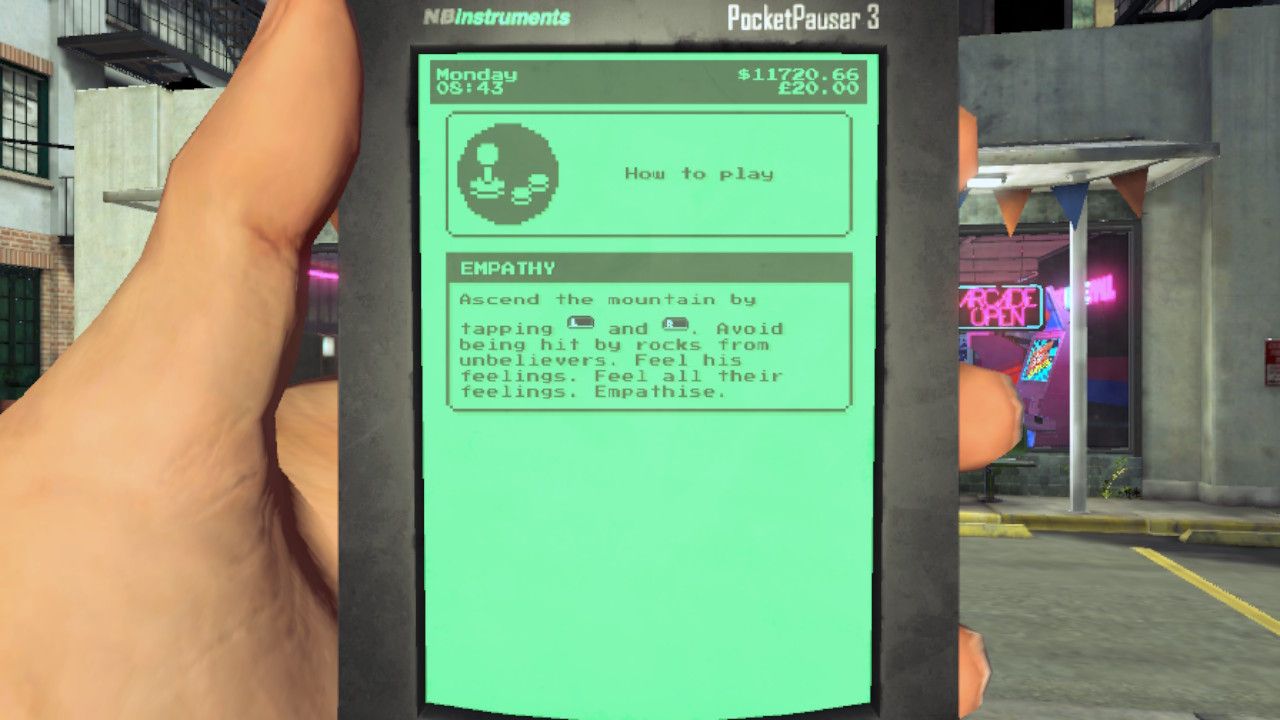
These quotes quite eloquently capture how Empathy functions as a game. Two levers help the character walk up a mountain; players move these levers via alternating button presses on the game pad, where the objective is to walk towards a "destination" (or so the character believes). The score is calculated in terms of "steps", and hazards are in the form of mysterious beings throwing rocks. The idea is to keep the character moving by controlling its walking speed, trying not to get hit by a rock while also not falling off the path.
Limitations can often push game creators into unique solutions, and they often come up with artistic nuances they otherwise would not have thought of. The idea of "self-limiting" is a lost artform in game design, and so when Gordon first got into the process of creating games, it was about pushing the boundaries of his own limitations.
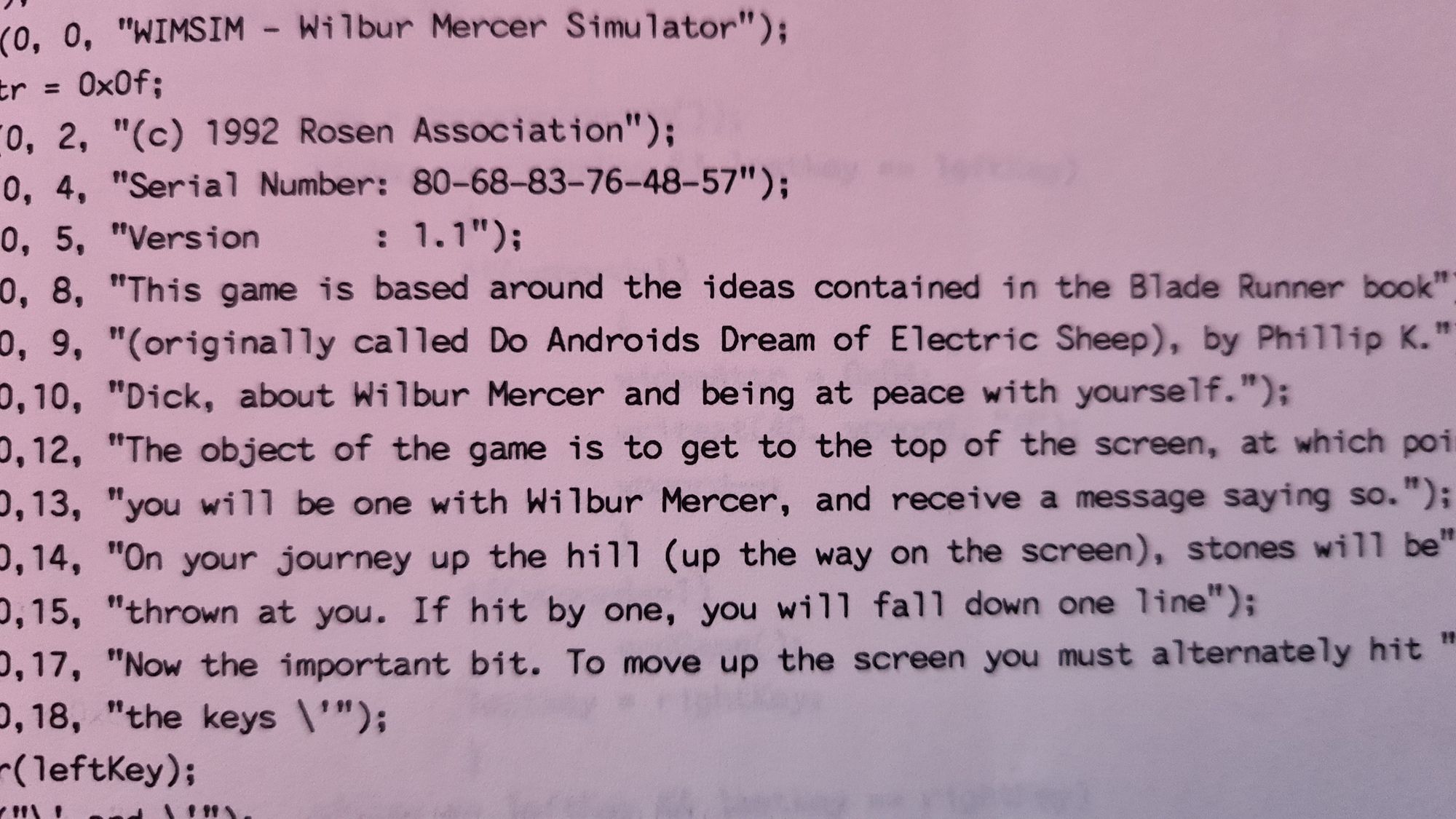
"Neil and I decided to write a version of this using ASCII art and our limited programming skills, and that's what was included in our Shareware pack. We called it 'WimSim' because the character you merge with in the game in the novel [Do Androids Dream of Electric Sheep] is called Wilbur Mercer. WimSim is the internal code name of the game in Arcade Paradise too, it's only called Empathy in anything the public can see."
Gordon Bell
WimSim, the prototype for what would eventually become Empathy, was essentially a direct adaptation of the Empathy Box vividly described in the novel, and the game even shared its namesake with a primary character. When an opportunity game to create new games for Arcade Paradise, it was a chance for Gordon to take a cool experiment from his youth and turn it into a fully-realized game. Of course, this was achieved with the help of some valuable input from the rest of the development team at Nosebleed Interactive, as he further explains:
"When it became clear that we were going to do DLC for Arcade Paradise, I was excited to have the opportunity to revisit WimSim and see if we could make something fun and interesting out of it. Adam, one of our game designers, was tasked with bringing my teenage dreams into reality and he worked on the game based on a short design document I had written based on my memories of the original.
The original WimSim had incredibly simplistic 'graphics', which from memory were something like this:
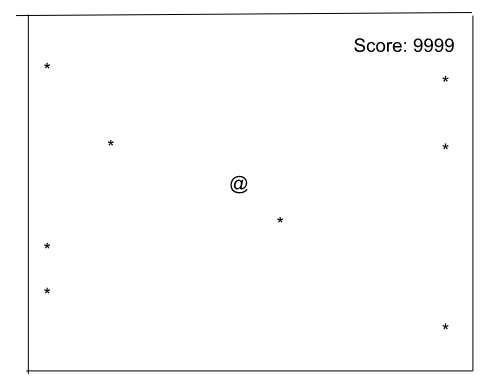
It was important for me that we had a similar feel for the new version [Empathy]. We realized we had to make it more interesting and give it a bit more character, and I think Adam did a fantastic job of capturing the essence of the original whilst making it look a lot more readable and interesting for players, his 'mysterious attackers' are particularly great.
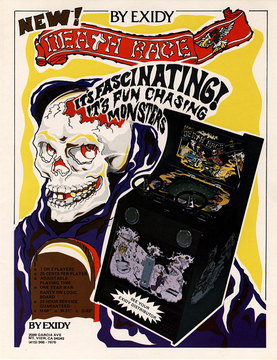
The gameplay was tweaked slightly, in the original [WimSim] you also had to 'button bash' to move, but you continually ascended and had lives which were lost if you were hit by a rock. In the new version [Empathy] you can never reach the top of the screen (which makes it feel more like a nightmare) and the rocks cause you to fall downwards. Fall off the bottom of the screen and it is game over.
The 1976 arcade game 'Death Race' was also an inspiration for the look and feel of Empathy. It has incredibly simplistic B&W graphics, but the sound gives it a nightmarish quality. We wanted Empathy to feel like a very early video game."
Gordon Bell
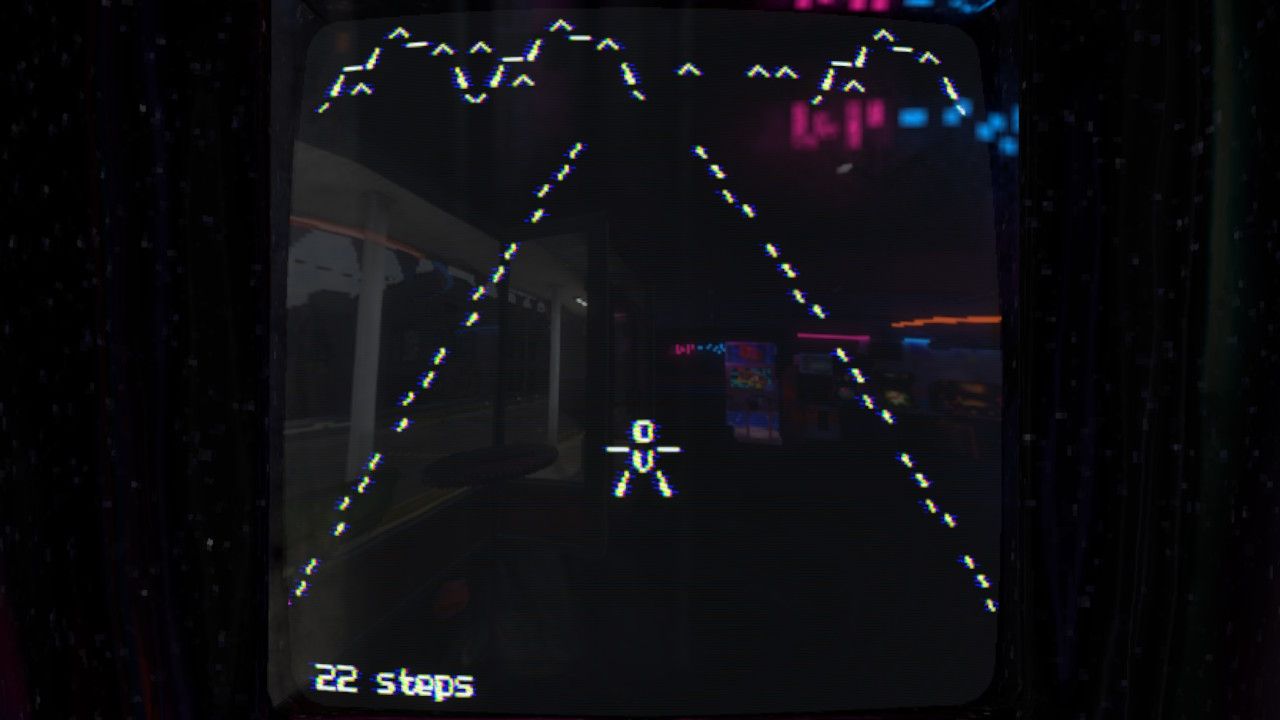
There are often incredible origin stories behind video games. And, as simple as the gameplay may be, the enigmatic nature of Empathy suggested there was going to be a fascinating story behind it. This is a game that almost carries the aura of an urban myth akin to Polybius.
"The myth of Polybius was definitely in our minds when creating Empathy. As we worked on it, we realized that it felt very mysterious and scary, so we decided to lean into this by giving the machine an imagined backstory in which there was only this one machine in the world, and it moved from arcade to arcade when the owners got too intimidated by it and had to sell it on. Like a cursed object. If you look on the back of the machine you can see that someone has written 'Internal Use Only' on it in marker pen to back up the idea that it somehow escaped, or was stolen, from a laboratory somewhere and was never meant to be played by the public. The metal plaque on the back also reveals that it's manufactured by Rosen Manufacturing, which is a play on the name 'Rosen Association', which was the novel's [Do Androids Dream of Electric Sheep] equivalent of the Tyrell Corporation from the film [Blade Runner].
Nosebleed Interactive's history with Polybius goes back to our first game The Hungry Horde. That game is a top-down twin-stick game where you control a horde of zombies, and in one of the levels you can find a Polybius arcade machine. Approaching that machine will cause a horde of FBI agents to spawn and attack you.
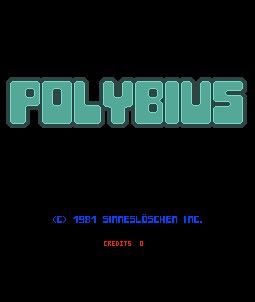
I'm not sure when I first encountered the idea of Polybius, but I assume it was when I was at university and was reading Usenet every day? Or perhaps in the 2000s when it seems to have become more widely known? Either way, I think it's a really powerful urban myth. The video game world doesn't have a huge number of urban myths, and they tend to be around hidden features/bosses in games that came out and everyone owned, so the idea of this one-off machine existing, that was created by a shadowy government organization, for potentially evil purposes, certainly stands out. It also has that vague ring of plausibility about it, perhaps not the government involvement, but the idea that a machine was built and tested and had to be withdrawn because of the psychological damage is exciting and piques my interest. We definitely wanted Empathy to have that feel to it too. And shout out to Jeff Minter for finally making Polybius a reality in 2017 with his excellent PS4/PSVR/PC game of the same name!"
Gordon Bell
Empathy is a deceptively simple game.
The core gameplay input is basic, but the way it articulates in the game design works extremely well given the journey the character takes into the unknown with no clear destination on the horizon.
Gordon explains the process behind the design and its basic gameplay hook:
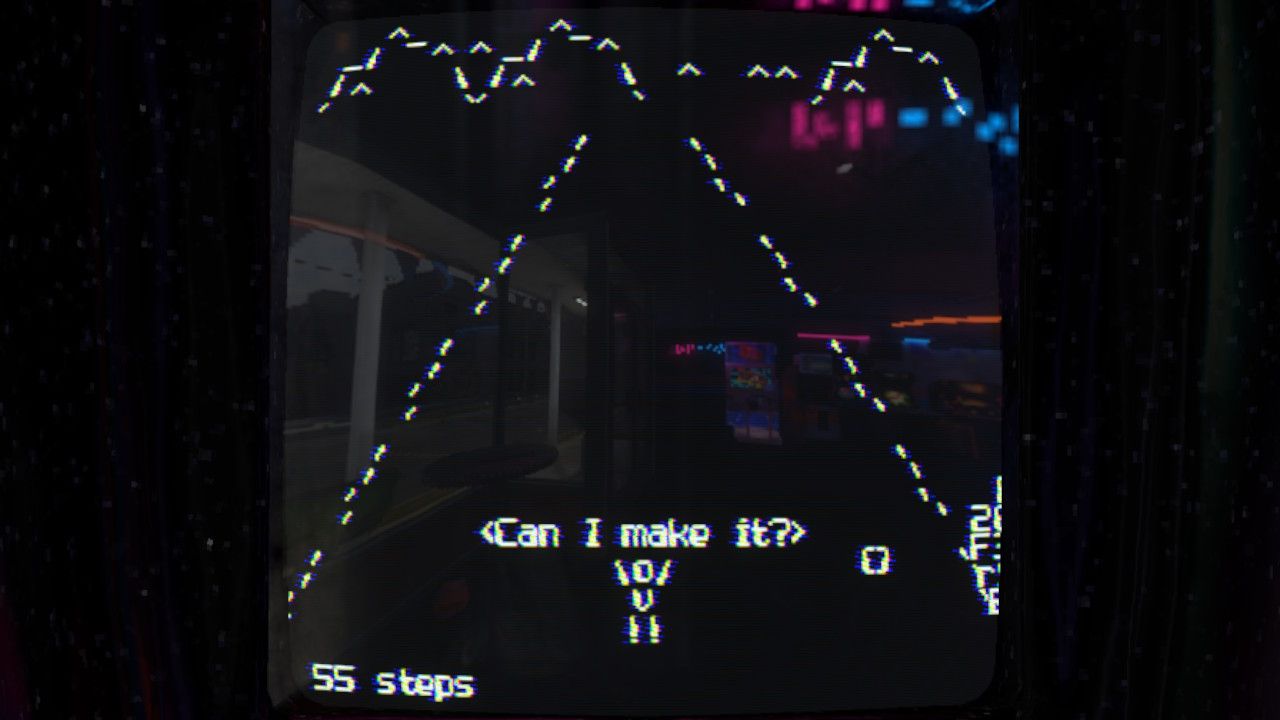
"I'm extremely glad that you picked up on the idea of a character walking and being on a journey. With such abstract graphics it was hard to know if anyone would ever pick up on the theme, so Adam and Jordan have done a great job to make that come across. The original version of WimSim was heavily based on the game described in the novel [Do Androids Dream of Electric Sheep], so we needed some gameplay that would try and capture the existential dread of the Empathy Box. Given our limited programming skills at the time, the idea of doing a 'button basher' came to mind, so that the player has a physical struggle to match the psychological struggle in the novel.
For Arcade Paradise's version of Empathy, we were able to extend this with the idea of never being able to reach the end of the journey (i.e., top of the screen) no matter how hard you try, and that the attackers will always win in the end because you are not (physically) strong enough to maintain the rapid button pressing forever. Many players of the initial Arcade Paradise games loved the score attack side to machines, so we knew that making Empathy into an endless runner (walker) would give it some of the same appeal. As a final touch we added the quotes that appear from time to time, and these are comically written in the style of our teenage selves and the sorts of 'deep' thoughts that someone might think in such a situation. We had a lot of fun coming up with these!"
Gordon Bell
The arcade cabinet itself looks different from anyuthing else in Arcade Paradise. Where most of the cabinets have a distinct '80s or '90s influence, Empathy is one of the few that are closer to a '70s feel. Gordon explains:
"From my point of view my direction was that I wanted something intimidating looking, and organic. It was possibly influenced by the original Computer Space cabinet design.
This not only looks otherworldly, but it also gives the cabinet a really distinct feel compared to the rest of the cabinets in the game which are mostly very angular and traditional. As the gameplay is relatively simple, I thought it was important to make the cabinet feel more visually special than the others since we will be charging players real money to purchase it as extra content. We want players to want to own it."
Gordon Bell
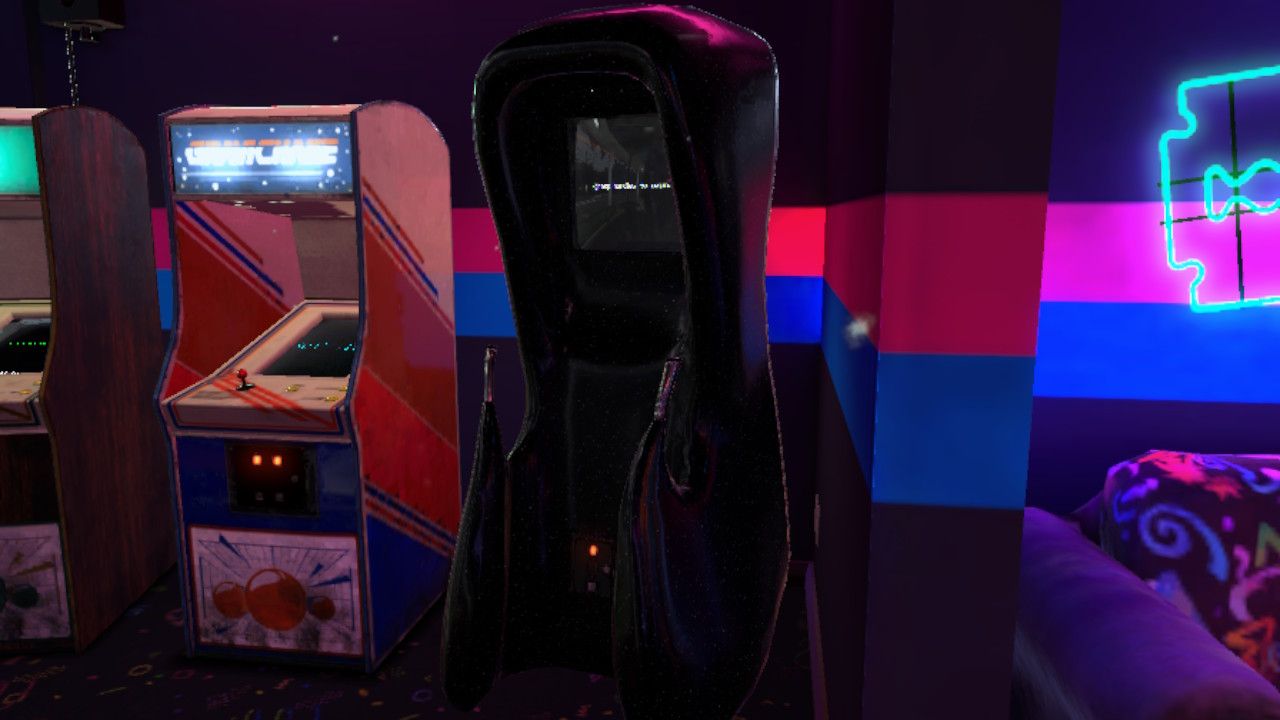
Bringing Gordon's Empathy to life was ultimately a team effort. It all started as a childhood project with his friend Neil, then it had the input from colleagues at Nosebleed Interactive. Jordan Quinn was largely responsible for the arcade cabinet design of Empathy. Here, he explains the process of designing the sleek yet mysterious cabinet:
"The thought process behind the design of the cabinet for a game, simply titled 'Empathy', leaves a lot of space for interpretation. So, turning to the gameplay, you the player embody the will power of the subject, who is being kept in a perpetual forward struggle with no end in sight. But with the constant awareness of the existential end being a few missed steps away, no matter how high your score gets. This framing of the game produces a certain feel of hopelessness for the subject from the players perspective. So, with all of the gameplay trying to break that characters will power with such a simple mechanic, the idea of weaponized apathy, began to stand out as a principal idea to aide in the design process of this cabinet.
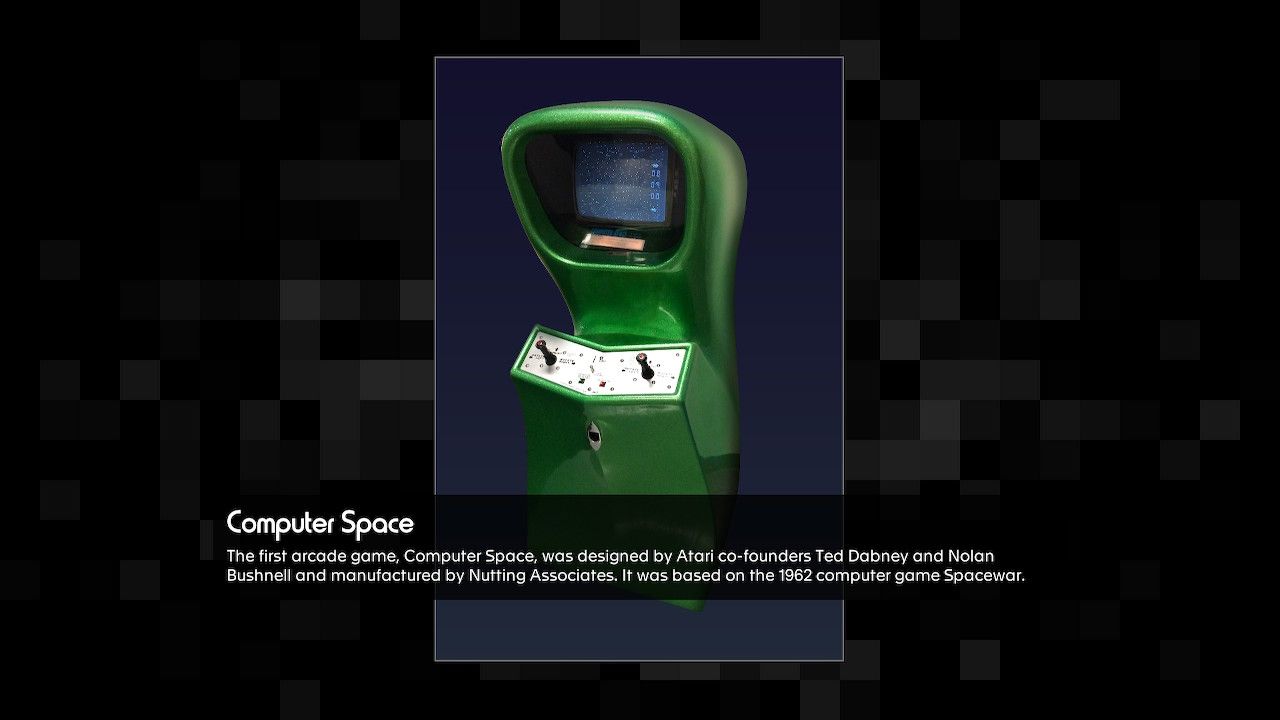
To begin packing all that into a box (with handles), was interesting. It was decided fairly early in the process that it should have a design not too distant from the Computer Space arcade cabinet designed by Nolan Bushnell. This served as a clear design to begin from. Iterating on where the handles were placed, where the screen sits relative to players view, what position it would make the player stand/look in, how it could envelope the player, all building on that idea of making the game harder for the player through simple design choices. The forms developed that best represented the hopeless mood we wanted it to personify, began to be clearly visible to take shape. Leaning into a hooded figure with arms extended, apathetically gifting the player the walking sticks necessary for this impossible journey.
As the fatigued design of the box took shape, it began being characterized as a cloaked figure. Combined with a need to maintain a visual coherence between the game and the cabinet. In addition to wanting to replicate a similar appearance as the aforementioned Computer Space cabinet's surface. It was decided that a glossy black surface with subsurface glitter would be the best way to interpret the themes decided upon."
Jordan Quinn
A final but significant touch to the overall presentation of Empathy is a selection of quotes which serve as internal monologues for the character. They are often existentially harrowing, occasionally hopeful; it almost feels like the game is directly communicating with the player itself.
"It's great to have finally made a proper game out of an idea I had 30-something years ago. If you'd told 16yr old Gordon that one day he'd be helping run a video game company and would be able to get WimSim released to the public, it would have blown his tiny mind.
As I hope I have shown, Empathy was also based on something from yesteryear, just something that probably only a tiny handful of people had ever played. Alongside that we took inspiration from real, and imaginary, arcade games to complete the look."
Gordon Bell
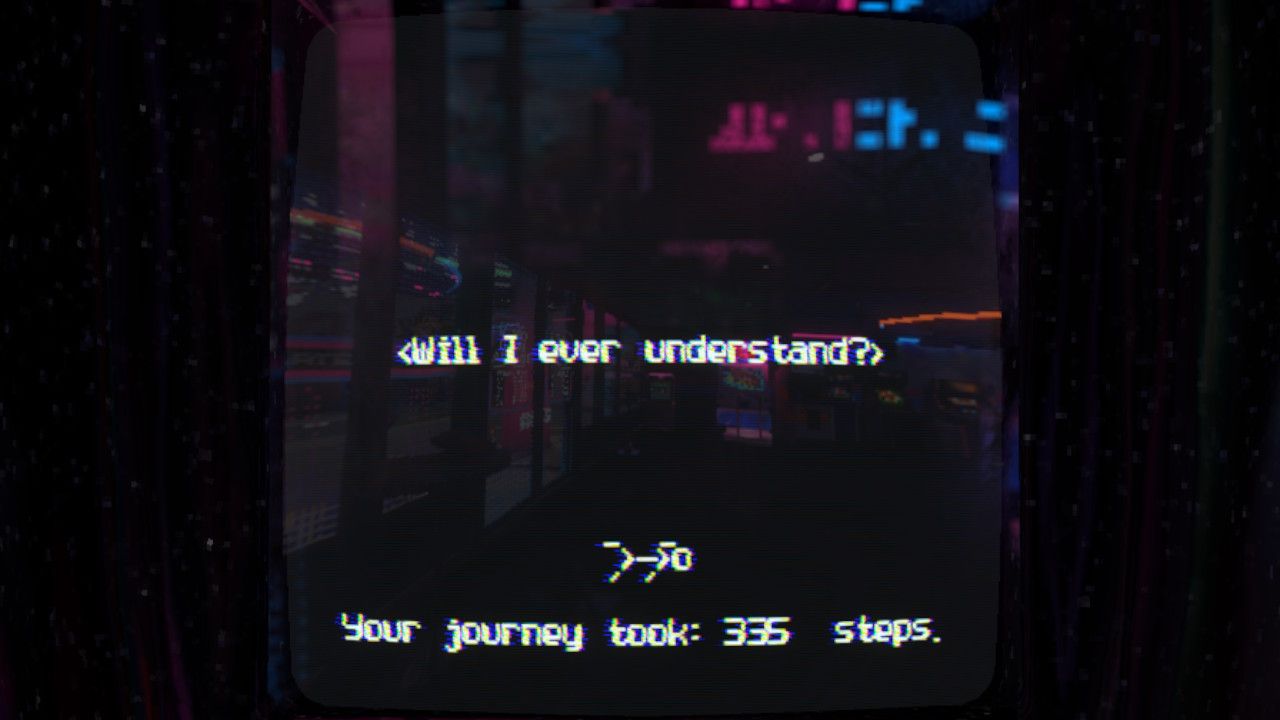
A huge thank you to Gordon Bell for taking us on the journey behind the creation of Empathy.
Arcade Paradise and its Coin-Op Pack 1 DLC are currently available on all major gaming platforms.
